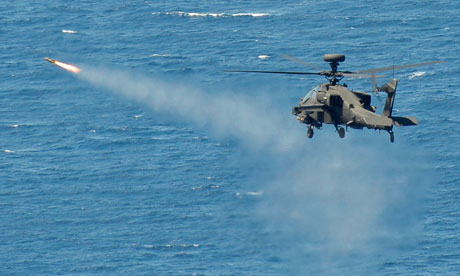British Apache helicopters strike Gaddafi’s forces for first time
![]()
UK and French attack helicopters hit several locations, including near oil city of Brega, as Nato boosts Libyan rebel campaign
David Cameron made the decision to send four British Apache helicopters to aid the Libya campaign on 27 May. Photograph: MoD/ Guy Pool/EPA
British Apache attack helicopters have launched their first strikes on Muammar Gaddafi’s troops in Libya, including near the key coastal oil city of Brega, Nato has confirmed.
The RAF Apaches and French attack craft struck troops loyal to Gaddafi who were hiding in populated areas, giving a major boost to Libyan rebels on the ground and coming one day after government troops were forced from three western towns.
The Apaches hit two targets near the coastal city of Brega, the Ministry of Defence said in a statement., The helicopters took off from HMS Ocean, off the Libyan coast, and returned safely after completing their mission in the early hours of Saturday.
The French helicopters took off from the helicopter transport ship Tonnerre in the Mediterranean, said Col Thierry Burkhard. He said the French helicopters struck 15 military vehicles and five military command buildings and came under light fire, but were not hit or damaged.
Burkhard said the operation was aimed at putting “additional pressure on the Gaddafi forces who continue to threaten the civilian population”.
Until now, Nato has relied on attack jets, generally flying above 15,000ft (4,500m) and pounding pro-Gaddafi targets in relentless overnight bombings. But the helicopters are a game-changer, giving the alliance an advantage in close-up combat, flying at much lower altitudes.
The decision to send four British Apache helicopters to Libya was made by David Cameron on 27 May. Their deployment via HMS Ocean means there should be less chance of civilian casualties in operations that previously relied on the use of Tornado and Typhoon aircraft. But the Apaches operate at lower altitudes and could be targeted by Libyan forces loyal to Gaddafi, who still have access to thousands of surface-to-air missiles.
Nato quoted Lt Gen Charles Bouchard, commander of the Libya operation, said as saying the engagement “demonstrates the unique capabilities brought to bear by attack helicopters”.
The strikes came after Libyan rebels on Friday won control of four towns in the western Nafusa mountain range, where government forces have besieged and randomly shelled rebel-held areas for months. After weeks of siege, government forces drove about seven tanks and a number of armoured vehicles into Yifran in early May and surrounded its Galaa nearby, said Col Jumaa Ibrahim of the region’s rebel military council.
Fighters who had fled then used their knowledge of area to chip away at the government forces, he said. On Friday, the rebels entered the town to find that the last government forces had left the day before.
The rebels also pushed government fighters from Shakshuk and Qasr al-Haj, two villages near a road that runs along the mountain range’s northern edge, Ibrahim said. The latter holds an important power station for local towns.
Ibrahim said rebel forces took the towns on Thursday then moved north to clash with Gaddafi forces in the village of Bir Ayyad on Friday. There were no reports of casualties.
The small rebel force in the western mountains is unlikely to threaten Gaddafi’s hold on Tripoli, 45 miles (70km) north-west, but the victories could bring relief to local residents by opening up roads between their communities. The western mountain population is tiny compared to the large rebel-held territories in east Libya.
Related Articles
Tunisian Elections: The Islamist Experiment
![]()
A Tunisian woman passes a wall covered with posters of candidates during last week’s campaign for electing the constitutional assembly.
Real Versus Fake Crises: Concealing The Risk of An All Out Nuclear War
![]()
We have reached a turning point in our history. The US and its allies are preparing to launch a nuclear
Capitalist Crisis, Radical Renewal? An Interview with Leo Panitch, Sam Gindin, and Greg Albo
![]()
by Sasha Lilley: Liberals and leftists alike argue that the economic crisis was caused by a lack of state regulation


